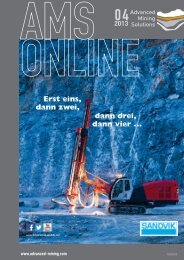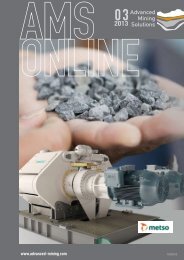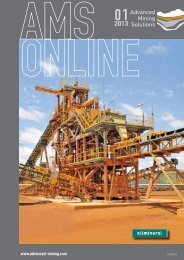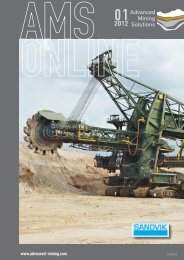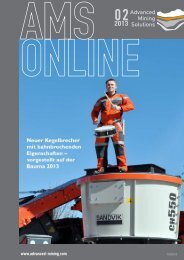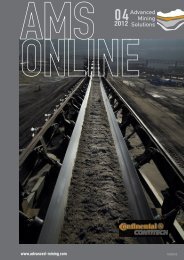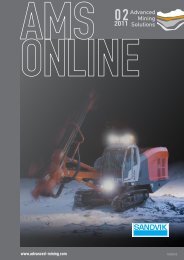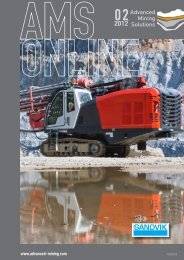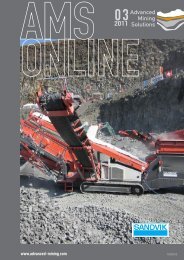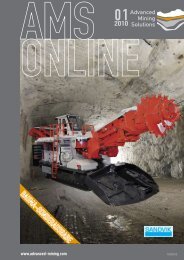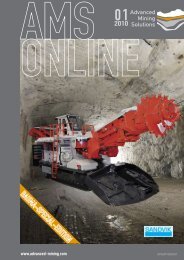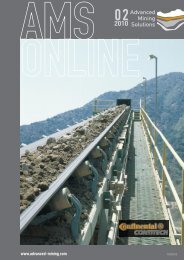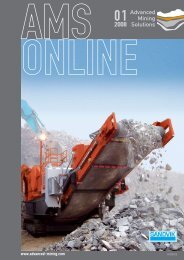A new face drilling rig for narrow tunnels and ... - Advanced Mining
A new face drilling rig for narrow tunnels and ... - Advanced Mining
A new face drilling rig for narrow tunnels and ... - Advanced Mining
Create successful ePaper yourself
Turn your PDF publications into a flip-book with our unique Google optimized e-Paper software.
Issue 04 | 2010<br />
TRANSFER OF TECHNOLOGY<br />
Comparison of various ship-unloading equipment<br />
<strong>for</strong> bulk materials concerning their specific energy<br />
consumption per ton<br />
by Dipl.-Ing. C. Tilke, Dipl.-Ing. S. Rakitsch, Prof. Dr.-Ing. Dipl.-Wi.-Ing. W.A. Günthner<br />
fml -Institute <strong>for</strong> material h<strong>and</strong>lings, material flow, logistics<br />
University of Technology Munich | Germany<br />
Dr.-Ing. R. Mutschler, FLSmidth KOCH MVT GmbH<br />
Wadgassen | Germany<br />
The worldwide discussion about carbon emissions as a main reason <strong>for</strong> global warming as well as the<br />
economical difficulties of many port operations due to less turnover <strong>and</strong> high energy costs were the main<br />
reasons <strong>for</strong> the Institute <strong>for</strong> material h<strong>and</strong>lings, material flow, logistics (fml), University of Technology Munich,<br />
Germany, to initialise an investigation focusing on the specific energy consumption of various ship-unloading<br />
equipment <strong>for</strong> bulk materials, especially coal.<br />
The relevance of hard coal as a primary<br />
energy carrier<br />
As Fig. 1 shows, today hard coal is still the most<br />
important primary energy carrier after crude oil. If you<br />
believe international experts the dem<strong>and</strong> <strong>for</strong> hard coal will<br />
grow much faster than that <strong>for</strong> oil in the next 20 years, with<br />
the effect that the consumption will almost double in the<br />
same period.<br />
The economic per<strong>for</strong>mance of the worldwide steel<br />
<strong>and</strong> electricity industry is to an extremely high degree<br />
dependent on the extraction <strong>and</strong> the import of basic<br />
commodities like hard coal or iron ore.<br />
If you take Europe, <strong>and</strong> especially Germany, as an<br />
example, where a considerable amount of hard coal<br />
is needed <strong>for</strong> the production of steel <strong>and</strong> electricity,<br />
underground mining is economically unviable everywhere<br />
in Europe due to the cheap coal prices on the global market.<br />
As a result, many of the local coal mines were closed.<br />
Indeed, there are a few mines that survived, supported by<br />
German subsidies, but no doubt even these mines will be<br />
closed when subsidies end in 2018.<br />
As the European dem<strong>and</strong> <strong>for</strong> the coal has not seriously<br />
decreased in the comparison period, the European<br />
Union (EU) is in dire need of imports from coal-producing<br />
countries. Fig. 2 shows this correlation using the example<br />
of all German non-re<strong>new</strong>able energy resources.<br />
Fig. 1:<br />
Development of Primary<br />
Energy Consumption<br />
Worldwide (cumulative) <strong>and</strong><br />
Projections of<br />
IEA until 2030. (Sources: BP<br />
<strong>and</strong> [1])<br />
www.advanced-mining.com<br />
58



